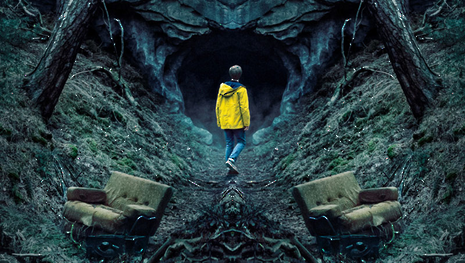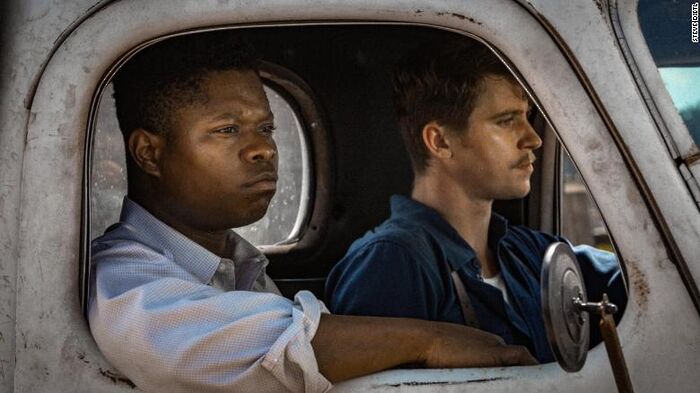Dark review: ‘an increasingly tangled web’
Despite having much to praise, Rosie Chalmers finds this Netflix series soon loses its fire

Netflix’s new German thriller Dark takes place in the gloomy and constantly raining forest town of Winden in 2019. Restricting itself to this claustrophobic neighbourhood, the ten episodes centre around the disappearance of young children. It soon becomes clear that this is a recurring issue with children vanishing every 33 years. From this discovery, the series expands beyond its current time frame to show the abductions from 1986 and 1953 and slowly forcing the viewers to begin to conceive of someone meddling and shaping each of these events.
What is most interesting is the use of multiple actors to portray the same character at different points in time. Rather than confusing the viewer or leading to a weaker character, overall this allows us to see Winden’s inhabitants grow in wonderful detail and the events and relationships that shape who they are. Moreover, it draws us into an increasingly tangled web of a small town where families have known each other for years. The grievances, hatred and romances of one time period are then shown to have unimaginable influences on the next.
“A relentless thriller which transforms the concept of time travel from exciting and adventurous to terrifying”
Ludger Bökelmann plays Ulrich Nielsen as a powerless and angry teenager in 1986 unable to cope with his brother’s sudden disappearance. Decades later in 2019 he is now played by the incredible Oliver Masucci forced to relive this as his young son also mysteriously vanishes. The two actors work in an impressive partnership to illustrate the character’s continued sense of uselessness and descent into manic violence as he tries to make sense of the repeated tragedy.
Winden itself is a wonderful invention. The town is supported by a large nuclear power station which is harbouring its own toxic secrets and lies on top of an underground labyrinth of caves. At this point, resemblances to Stranger Things become apparent. However, Dark was already in production before that show’s release, and veers away from nostalgic 80s references towards unnerving scientific theories about destiny and time travel.
Taking place in winding caves and a mysterious underground bunker, Dark has a chillingly malevolent presence that removes the outside world and any possibility of escape. Partnered with Ben Frost’s chilling and somewhat ethereal soundtrack, it is a relentless thriller which transforms the concept of time travel from exciting and adventurous to terrifying. Characters become locked in alternative time zones with no choice but to live in their temporal prison and grow up alongside their parents and grandparents.
The crucial events always happen at the beginning of November, a sly hint towards Germany’s Schicksalstag or ‘Day of Destiny’ – the name given to the phenomenon of turning points in Germany’s history always happening on 9th November. This includes the forced abdication of Kaiser Wilhelm II in 1918, Kristallnacht in 1938, and the fall of the Berlin Wall in 1989.
Hence the repeated disappearances of young children, continued inadequacy of the Winden police, and the shadowy involvement of the nuclear power station become reminders of our inability to escape the past. Peppered with references to Nietzsche’s theory of eternal return, Dark is particularly compelling in a time where the mistakes and hatred of the 20th century seem to be coming back with a vengeance in the 21st.
However, towards the end of the series, Jonas Kahnwald, distinctive in his Stephen King-inspired yellow raincoat, begins to attempt to change the events of past and future. This glimmer of hope comes too late in the series. The sense of unescapable destiny has been so firmly established it is difficult to get excited for the action and revelations hinted at in the next instalment. Moreover, it makes the current series seem slow-moving and overly focused on setting up the drama rather than offering any sense of fulfilment. Dark is truly mesmerising but would be vastly improved if it could be wrapped up faster without filling ten episodes and then self-indulgently spilling, having lost some momentum, into a second season
 News / Pembroke to convert listed office building into accom9 December 2025
News / Pembroke to convert listed office building into accom9 December 2025 News / Gov declares £31m bus investment for Cambridge8 December 2025
News / Gov declares £31m bus investment for Cambridge8 December 2025 Features / Searching for community in queer Cambridge10 December 2025
Features / Searching for community in queer Cambridge10 December 2025 News / Uni redundancy consultation ‘falls short of legal duties’, unions say6 December 2025
News / Uni redundancy consultation ‘falls short of legal duties’, unions say6 December 2025 Lifestyle / Into the groove, out of the club9 December 2025
Lifestyle / Into the groove, out of the club9 December 2025










